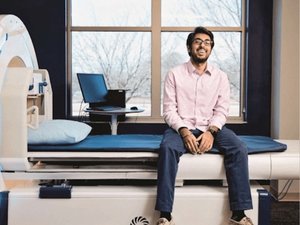Dr. Jon Thompson was told for years it couldn’t be done.
Standard Bariatrics, the company he co-founded and in September 2022 helped lead to a rare nine-figure exit, certainly defied the odds in more ways than one.
Standard’s flagship device, the Titan SGS, stands as true breakthrough technology. The first-of-its-kind surgical stapler delivers the industry’s longest continuous staple line at 23 centimeters. For surgeons performing laparoscopic sleeve gastrectomy, a common weight loss procedure, the goal is a more consistent and symmetrical sleeve pouch anatomy, which improves clinical outcomes, meaning less post-operative complications for patients.
Other devices on the market measure at 6 centimeters. Competitors never even considered making a longer stapler, because from an engineering standpoint it was considered impossible, Thompson said.
“This (device) is a magic bullet,” he said.
The company, as startups often do, sometimes teetered on the brink of extinction. Most notably in 2020: Standard Bariatrics was navigating a delay in U.S. Food and Drug Administration approval for its stapler, while a mere two months away from running out of cash. The team was even further strapped by a halt in elective surgeries amid Covid-19. Its surgical clamp, today used alongside the stapler, was then its sole source of revenue.
Several Ohio-based funding partners stepped in, including JobsOhio, CincyTech and Queen City Angels. That injection of income helped the company weather the storm.
The stapler hit the market in 2021, catapulting the company from a projected $1 million in annual revenue to a major competitor in a billion-dollar market.
In September, Standard Bariatrics was acquired by global medtech company Teleflex in a deal worth $300 million, including earnouts.
It’s one of the region’s top three largest exits ever.
For Thompson, a bariatric surgeon, “it shows what can be done with the resources here.”
“The near-death experiences happen less frequently now,” he said. “As a surgeon, when somebody’s dying, you figure out how to keep them from dying. That’s how you’ve got to think about this. It’s life over limb.”
For this reason, Standard Bariatrics was chosen as Startup of the Year for our 2023 Fire Awards, Cincy Inno’s premier awards program. Each year we celebrate companies that produced banner results, whose momentum helps spur a flywheel effect for the whole community. In the case of Standard, exits beget exits. Startup sales move potential founders, those maybe lower in a company hierarchy, off the bench to pursue their ideas. More investors open their wallets, hoping to catch the next big wave.
Case in point: Martin, a media buying startup for agencies and brands, sold last year for $45 million to California-based adtech giant Pubmatic. Martin is this year’s Fire Award winner for women-led firms.
Co-founders Tanja Mimica and James Hassett said they watched Shashank Saxena, CEO of Vndly, guide his company through a $510 million sale to Workday in 2021. That exit still stands as the region’s largest.
For the Aussie natives, who relocated to Cincinnati and opted to stay here and build their business, it acted as a guiding light.
“It’s motivating,” Hassett said. “It shows it’s possible. We never thought about moving or doing this somewhere else because you see lots of good examples of success.”
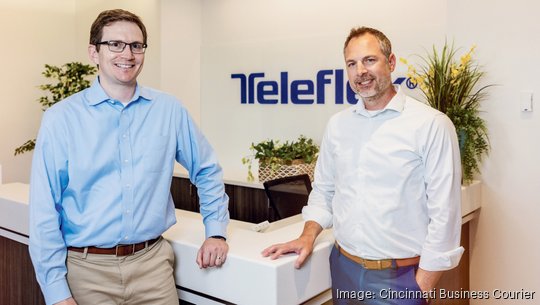
Startup of the Year: Standard Bariatrics
Standard Bariatrics always seemed destined for an initial public offering. Instead the company made a major pivot with its September 2022 sale to global medtech company Teleflex.
The timing was right, founder Dr. Jon Thompson said. The IPO market had tanked, and in the startup world, nothing is ever a sure thing.
Plus, as they say, a bird in the hand is worth two in the bush. The deal stands at $300 million, including earnouts, one of the region’s largest exits ever.
“We decided we couldn’t say no,” Thompson said.
Teleflex’s involvement is expected to accelerate Standard Bariatrics’ growth and the investment in its business. The Titan SGS, a first-of-its-kind surgical stapler, is Standard Bariatrics’ flagship device. Thompson, a bariatric surgeon, said it fulfills an unmet need. It offers surgeons the longest continuous staple cutline. That means its users can achieve more consistent and symmetrical sleeve pouch anatomy, which leads to better patient outcomes.
The exit brought changes – integration in deals this size can take months, even a year or more. Teleflex has maintained Standard Bariatrics’ Cincinnati presence and more than doubled the salesforce behind the Titan. President and CEO Matt Sokany and Chief Financial Officer Peter Donato both left.
Thompson, Standard Bariatrics’ chief medical officer, moved into a consultant role for Teleflex. And Adam Dunki-Jacobs, formerly chief of operations and chief technical officer, is chief technology officer of bariatrics for Teleflex.
Dunki-Jacobs said the goal is to continue to build. More than 7,000 sleeve gastrectomy procedures have been completed using Titan since its introduction to the market in 2021.
That number will continue to grow.
“We’re focused on what we want to be focused on,” he said. As a startup, the company was much more concerned with fundraising and cashflow.
In an ideal world, Dunki-Jacobs said, the Cincinnati office would serve as an innovation hub.
The deal is a big win for the region. It helps silence the negative perception that has surrounded Midwest medtech.
“This validates us to investors that aren’t local,” Dunki-Jacobs said.
There was also always a lingering question from funders: If this type of stapler was possible, it would have already been done 10 years ago.
“That’s one of the reasons why,” Dunki-Jacobs said. “(We) hope we can continue to drive innovation, and not just for Standard Bariatrics products, but anywhere we see an unmet need that needs a product solution.”
– Liz Engel
About the company
Company: Standard Bariatrics (now part of Teleflex)
Office: Evendale
Employees: 20 in Cincinnati; 15,500 globally
Local leaders: Adam Dunki-Jacobs, executive director; Dr. Jon Thompson, founder
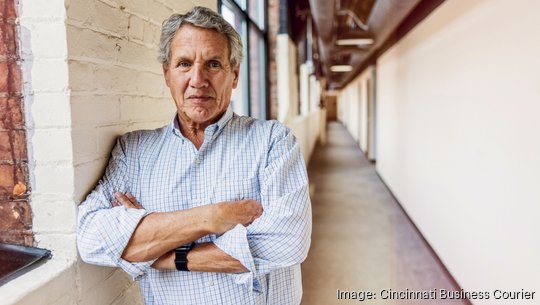
Best Tech: Sense Neuro Diagnostics
For Geoff Klass, the goal line is finally in sight.
Klass’ Sense Neuro Diagnostics recently received approval from the U.S. Food and Drug Administration for the final clinical trial related to its first device, NeuSTAT, a noninvasive scanner able to detect brain bleeds. That trial, which Sense expects to wrap up in the fourth quarter, is the final hurdle in a yearslong journey toward commercialization.
“Because we’re a de novo device, meaning there’s nothing like us … it takes us a little bit longer to get through the clearance process,” Klass said.
Norwood-based Sense, founded in 2014 by four University of Cincinnati physicians, is developing multiple noninvasive brain scanners. Sense’s nonintrusive technology has the potential to collect 360 data points in 2.5 seconds to detect brain hemorrhage or stroke type, helping first responders, emergency department personnel, neuro ICU teams and military field hospitals assess and monitor traumatic brain injuries. There are even long-term efforts focused on concussion detection and monitoring.
And if that wasn’t enough, Klass’ team continues to plow ahead on additional clinical trials the Department of Defense is backing for another of its marquee devices, named NeuroHawk. That portable device can detect and continuously monitor traumatic brain injury on a battlefield or, more widely, emergency rooms.
“The interesting part of our discussions with the military is that they are looking at companies with a military purpose but also a significant commercial market for that product as well,” Klass said. “We fit into that frame very well.”
And with the forward momentum surrounding its devices, Klass aims to ramp up Sense’s commercial strategy, including hiring a sales chief.
The goal is to have Sense ready to sell its device as soon as it receives regulatory approval. Klass anticipates that happening next year for the NeuSTAT and in early 2025 for NeuroHawk.
Fundraising efforts will also increase as commercialization nears, Klass said.
To date, the company has raised more than $14 million in total funding, including equity from an investor roster of Queen City Angels, Accelerant Ventures in Dayton, Cleveland Clinic, the Global Cardiovascular Innovation Fund and a private group of Cincinnati-based neuro physicians.
“We feel like we’re finally there,” Klass said.
– Meg Erpenbeck
About the company
Company: Sense Neuro Diagnostics
Headquarters: Norwood
Employees: 6
Local leader: Geoff Klass, CEO

Catalyst: Main Street Ventures
Main Street Ventures may be one of the region’s best-known boosters of small businesses, but Sean Parker is thinking big when it comes to the Over-the-Rhine mainstay’s future.
Parker joined the nonprofit in March and aims to parlay his BigCo experience to help create Cincinnati’s next one. His resume includes roles at Kroger, Procter & Gamble and Nike.
“There are some great public and private companies in town,” Parker said, naming Tire Discounters and Total Quality Logistics. He wants to propel others to that level.
Main Street Ventures offers several programs for and provides funding to companies across the Tri-State. Since 2018, the organization has distributed more than $3 million to over 100 local startups through its signature Launch and Leap grants.
Shortly before Parker’s arrival, Main Street Ventures awarded grants to its largest cohort to date. Though, topping that number isn’t necessarily Parker’s priority. Instead, he’s focused on attracting applicants his team feels have the best potential for success, with their help.
Its roster of past grant recipients includes several of Cincinnati’s buzziest companies, such as Black Owned, a local clothing brand from entrepreneur Means Cameron; and Wildweed, Chef David Jackman’s pasta restaurant that will open in Over-the-Rhine this fall.
Parker sees the potential for Main Street Ventures to become a national model for startup funding, one that’s inclusive of tech but not limited to it.
But what really separates Main Street Ventures from its peers, apart from offering its funds without asking for a stake in the company, is the organization’s emphasis on building the region’s next generation of entrepreneurs.
The nonprofit’s summerlong “Launch It: Cincy” program is back for its second year, providing undergraduate student founders access to resources to grow their startups. It culminates in a pitch contest.
Main Street also brought back its Inventure Entrepreneurship Academy, a free four-day program for young people to learn directly from startup leaders and business experts.
“By introducing high school students to entrepreneurship and encouraging them to develop an entrepreneurial mindset, we can help prepare them for success in whatever they choose to do in the future,”
Parker said at the time of the announcement.
– Meg Erpenbeck
About the company
Company: Main Street Ventures
Headquarters: Over-the-Rhine
Employees: 5
Local leader: Sean Parker, executive director
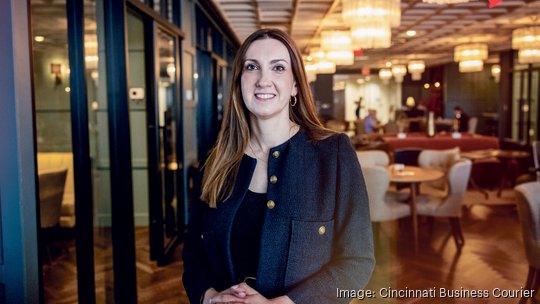
Women-led: Martin
When Martin co-founders Tanja Mimica and James Hassett first accepted a spot in Ocean accelerator in 2017, the first thing they did after saying “yes” was to pull up a map. The Aussie natives had no idea where Cincinnati was located, Mimica said. The leap of faith paid off for both the city and the couple.
After the program, the pair opted to stay and build their business here, landing a spot at another coveted local accelerator, the Brandery. Then followed an informal “corporate-startup” partnership with Over-the-Rhine-based ad firm Empower. That gave them a front row seat to the agency world and an ideal environment to build their product: a platform that uses machine learning to boost return on media spend.
Martin’s $45 million sale to California-based adtech giant Pubmatic in September 2022 provides access to a much bigger team and a broader, global audience.
Mimica said the Martin team wasn’t necessarily looking to sell, but it proved the right market opportunity.
Martin in May rebranded as Activate. Mimica, previously CEO, and Hassett, chief technology officer, have settled into new roles as VP of customer success and VP of engineering, respectively.
The plan is to remain rooted in Cincinnati.
“We had the option to move to San Fran or New York, but personally and professionally, Cincinnati’s been good to us,” Mimica said.
The Activate team started to work inside Empower after venture capitalists guided them upstream – encouraging the startup to sell to medium-sized media agencies and brands instead of small businesses.
Within the agency, they were able to sit, ask questions and meet with Empower employees. That formed the future premise of the business, which focused on programmatic advertising.
Mimica said the majority of ads served up on Hulu, Spotify and the web are bought through a process known as real-time bidding.
All this happens in the time it takes a webpage to load. Activate’s platform utilizes machine learning to determine if each auction is a good fit for the client, which ones should it bid on and for how much. Most importantly, it helps answer the question, what is the likelihood this user will go and make a purchase?
While Activate serves the demand side of the platform, Pubmatic, which carries a $955 million market cap, is an auction house. The company touted the Activate acquisition as a win for vertical integration.
– Liz Engel
About the company
Company: Martin (now Activate)
Headquarters: Norwood
Employees: 6 in Cincinnati
Local leaders: Tanja Mimica, vice president of customer success; James Hassett, vice president of engineering
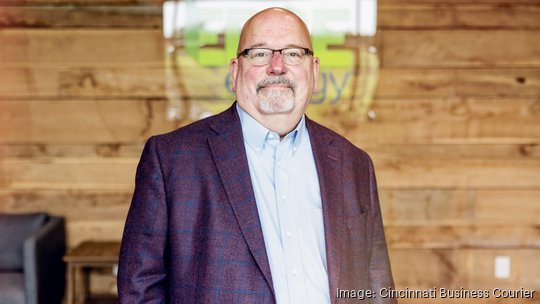
Sustainability: EdgeEnergy
EdgeEnergy is on a fast track to become Cincinnati’s next billion-dollar startup, no small feat considering only a handful of local companies can lay claim to unicorn status.
Fueled by a recent White House nod and a growing interest in – and funding for – electric vehicle charging infrastructure, there’s plenty of market opportunity. New use cases, in fact, seem to surface every day, with a customer pool that ranges from national parks to companies that retrofit tugboats with electric motors.
“No one else does what we do,” said CEO Greg York, a 25-year Procter & Gamble veteran who helms the 3-year-old company. “Competitors attempt to duplicate our product, but they rely on batteries, which maybe gives you 20 charges. Our device allows you to charge as many vehicles as deployed to that charging station, and it does it at a lower cost by leveraging the existing power grid.”
Based in Green Township, EdgeEnergy designs and manufactures conversion hardware that allows for the installation of DC fast chargers on single-phase power infrastructure, allowing for installations in “edge-of-grid” locations, or remote areas like state parks, small towns and rural resorts.
The tech allows for faster and lower-cost installation – no electrical infrastructure upgrades are needed – and addresses one of the greatest barriers to EV adoption: range anxiety.
In February, the administration of President Joe Biden touted the startup’s plan to spend $150 million to expand its manufacturing capabilities in Ohio and grow its team by 60 employees over the next 24 months.
The company is making the nine-figure investment privately with company revenue, and currently 94% of the components used to make its units are domestically made.
In five years, York predicts EdgeEnergy’s yearly sales will top $500 million. And that’s just in the United States. Its technology means emerging markets, including South America, Southeast Asia and rural Canada, can tap into reliable EV charging, democratizing overall access.
“Sometime in the next 24 months, we will go global. We’ve not done all the market research yet to quantify the market size, but you can imagine the same (demand) exists around the world,” he said.
– Liz Engel
About the company
Company: EdgeEnergy
Headquarters: Green Township
Employees: 8
Local leader: Greg York, CEO
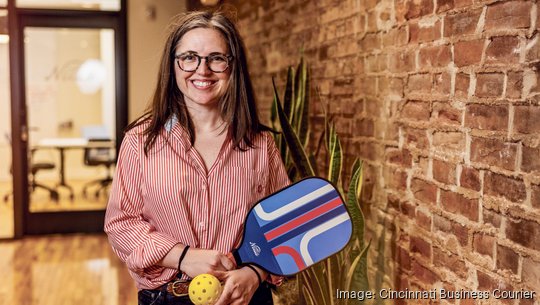
CPG: Nettie Pickleball Co.
Catherine Baxter’s background is in the nonprofit space, with stints at California’s OpEd Project and Planned Parenthood Southwest Ohio Region. But this founder received a crash course in entrepreneurship thanks to the rapidly changing market her company serves.
Nettie Pickleball Co. launched just as the sport – a combination of tennis, badminton and Ping-Pong – was exploding in popularity. Today, pickleball ranks as America’s fastest-growing sport, with the market for paddles alone projected to reach $256 million by 2028, according to researcher Absolute Reports. Baxter is now positioning Nettie to capitalize on that cachet.
“What’s surprising is the speed at which the category is moving and changing,” Baxter said.
At its August 2022 launch, Nettie offered a line of retro-inspired paddles. And while paddles will remain its flagship product, the brand is growing.
The company previously piloted a pickleball-specific bag which will soon roll out as a permanent offering. Baxter also teased plans for a line geared toward younger players, bucking the sport’s geriatric perception.
The goal with new products is to “make it even easier for people to get started and get playing,” Baxter said.
And while it’s not a new offering, Baxter said the brand hopes to grow its corporate gifting business this year.
Nettie’s stand-out look has been a big driver behind a litany of national press exposure, including the “Today” show, Women’s Health, Vogue and Forbes to name a few. That coverage, Baxter said, has helped drive sales.
“I think another important piece is the credibility factor,” she said. “When consumers are making a decision, if it’s something from a publication they trust, there’s a validator that has happened.”
Nettie’s paddles (priced at $79.99) are available online and through the company’s retail partners, the largest of which is Dick’s Sporting Goods. The company also links up with pickleball facilities throughout the country, giving Nettie a key touch point with potential buyers.
“If the first time they play pickleball is with Nettie, we think they’re more likely to buy our products,” Baxter said.
While Baxter declined to get specific, she said Nettie did seven-figures in sales last year, a number she expects to double this year.
“Something we’ve done a really good job at is figuring out how we find our lane, whether it’s distribution, products we come out with and even our operations,” she said.
– Meg Erpenbeck
About the company
Company: Nettie Pickleball Co.
Headquarters: Over-the-Rhine
Employees: 3 full-time, including Baxter
Local leader: Catherine Baxter, CEO
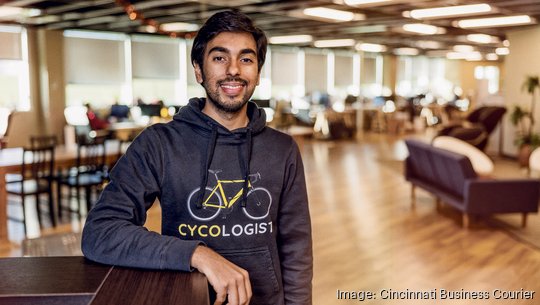
Health care: Genetesis
Mason-based Genetesis appears to be the next Greater Cincinnati medtech success story. Its flagship product, CardioFlux, is inching closer and closer to commercialization. Most recently in April landing a second and key “breakthrough device” designation from the U.S. Food and Drug Administration. The move will help fast track the company’s full market authorization, and better treat cardiac patients, the team said.
For Genetesis CEO and co-founder Peeyush Shrivastava, CardioFlux fills a key void in the market. Its MRI-like device uses noninvasive magnetocardiography, a technique that measures the magnetic fields produced by electrical activity in the heart, to rapidly scan for various heart conditions in 90 seconds.
That means patients can forgo the exposure, and risks and costs that come with radiation, contrast or exercise.
Its latest FDA approval is to identify myocardial ischemia in patients who may be suffering from coronary microvascular disease, or CMD. Myocardial ischemia occurs when the amount of oxygen that reaches the heart muscle is decreased, most commonly the result of coronary artery disease.
Historically, CMD has been hard to identify, and there’s an outdated perception that CMD is largely benign and non-fatal, Genetesis said.
Effective CMD diagnostics is largely inaccessible to most.
“This is not incremental but rather paradigm-shifting,” Shrivastava said. “We’re trying to build something revolutionary. Today, physicians are picking between what’s most effective and what’s most efficient. We want to eliminate that from the equation. In a world with CardioFlux, it’s all about diagnostic certainty without burden. That’s our mantra.”
Since it’s founding in 2013, Genetesis continues to beef up its leadership team to oversee key aspects of commercialization and clinical research. The company has also attracted prominent investors, including CincyTech and Austin-based Mithril Capital. The latter, a venture firm co-founded by billionaire Peter Thiel, led the company’s $17.5 million Series C.
Mark Cuban, Dallas Mavericks owner and a judge on ABC’s “Shark Tank,” has been on the board since 2016. Besides lending their business acumen, Genetesis’ backers have given the company a level of exposure not typically seen for in Ohio.
– Liz Engel
About the company
Company: Genetesis
Headquarters: Mason
Employees: 30
Local leader: Peeyush Shrivastava, CEO



